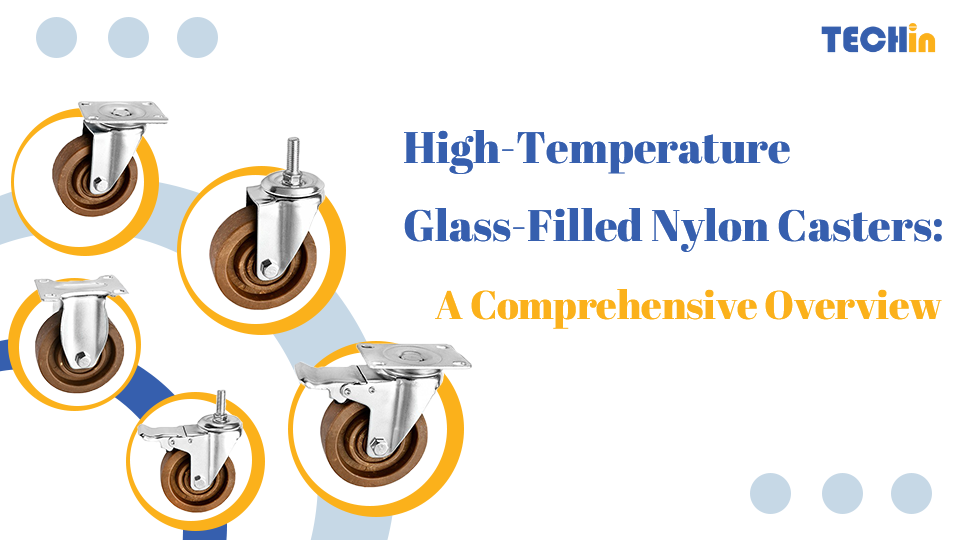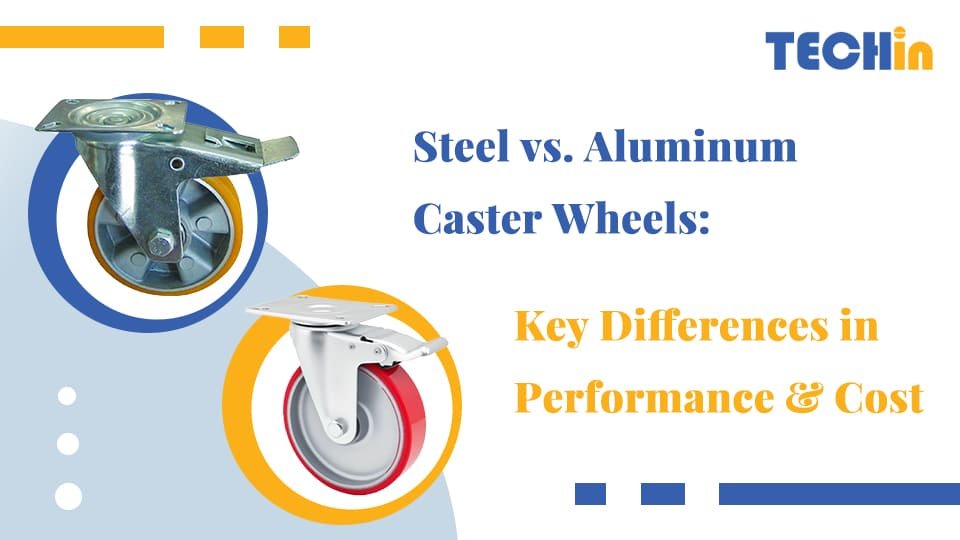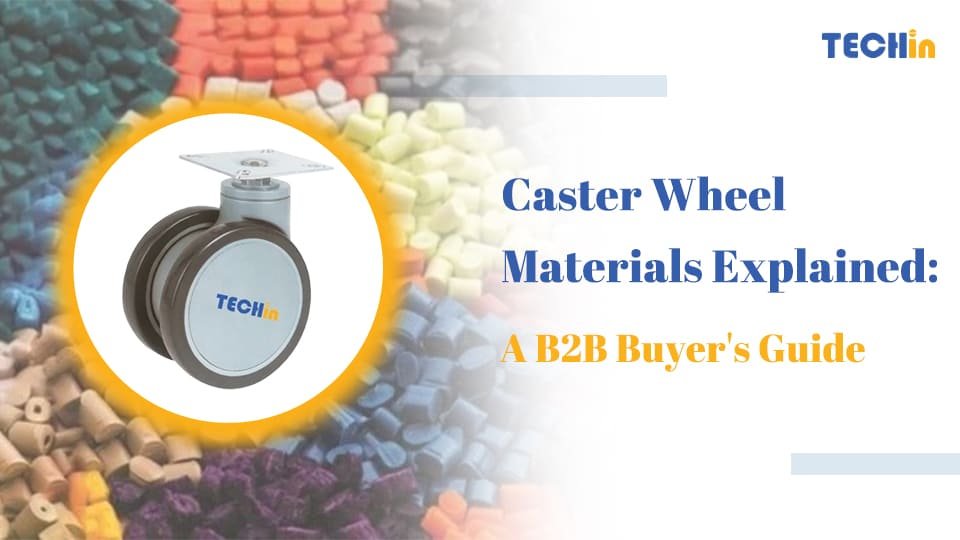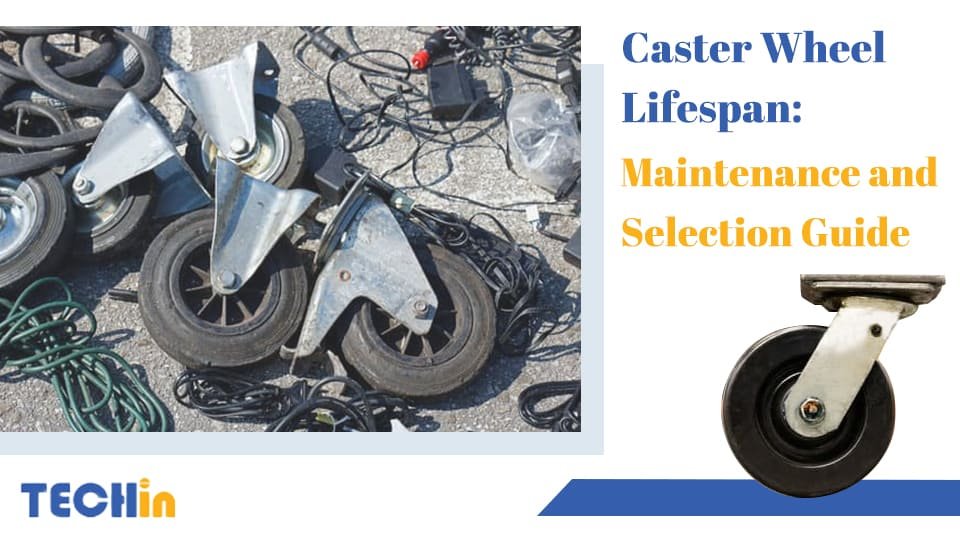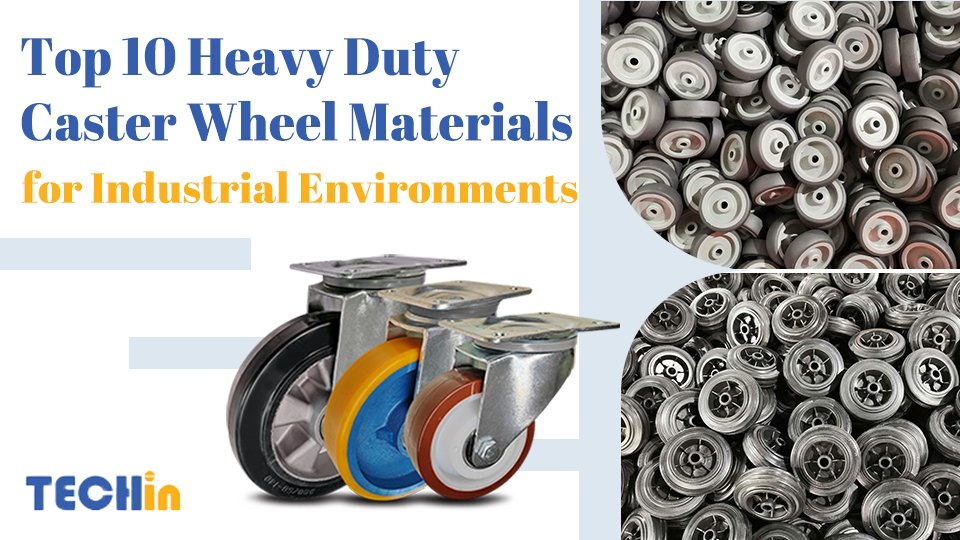Introduction
Finding the right caster for a tough environment isn’t easy. A wrong choice means you’re dealing with premature wear, safety hazards, and unnecessary downtime. Glass-filled nylon casters are specifically engineered for heat, moisture, and impact, making them a go-to solution for challenging industrial conditions.
Glass-filled nylon casters are a composite material made by reinforcing nylon with glass fibers. This process creates wheels that are exceptionally strong, moisture-resistant, and capable of withstanding up to 177°C (350°F). They excel in humid or chemical-rich environments, resist impact damage, and offer a long service life with minimal maintenance—making them ideal for industries that require reliable, high-temperature mobility solutions.
To understand why glass-filled nylon casters are gaining popularity, let’s explore their construction, key benefits, common applications, and maintenance requirements.
What is Glass-Filled Nylon Caster Wheel?
At its core, a glass-filled nylon caster wheel is built by infusing glass fibers directly into standard nylon resin. This simple reinforcement completely changes its performance, creating a wheel that:
- Maintains its shape under significant load and heat.
- Resists swelling or softening in wet or humid conditions.
- Performs well in environments that combine heat, chemicals, and frequent cleaning.
This makes it the go-to choice in applications where conventional plastic or metal wheels would quickly fail.
What Are the Pros and Cons of Glass-Filled Nylon Casters?
Like any specialized component, these casters have distinct advantages and trade-offs. Here is a straightforward comparison to help you make an informed decision.
| Pros | Cons |
|---|---|
| Heat-resistant up to 177°C (350°F). | Slightly lower temperature rating than phenolic casters. |
| Excellent moisture and chemical resistance. | Can be more expensive than standard phenolic wheels. |
| High impact strength, reducing breakage. | Not ideal for extremely heavy static loads compared to steel or cast iron. |
| Non-marking, floor-friendly surface. | May require specific bearings for optimal performance. |
| Lightweight but strong construction. | Limited to applications below their maximum temperature range. |
Common Applications of Glass-Filled Nylon Casters
You will find glass-filled nylon casters specified for industries that demand a combination of strength, cleanliness, and thermal stability:
- Food processing plants – withstand frequent washdowns and exposure to oils and cleaning agents.
- Pharmaceutical and medical facilities – resist chemicals and help maintain hygienic standards.
- Industrial kitchens and bakeries – tolerate high heat while enduring frequent steam cleaning.
- Chemical manufacturing – handle exposure to solvents and caustics without degrading.
- Laboratories and cleanrooms – valued for being non-marking and easy to sterilize.
Why Glass-Filled Nylon Casters Are Best for Humid and High-Temperature Environments?
The key advantage of glass-filled nylon emerges in humid or wet settings, especially when compared to phenolic casters which can absorb moisture and turn brittle. The glass reinforcement ensures the wheel:
- Prevents warping from temperature fluctuations.
- Maintains its integrity under continuous cleaning cycles.
- Offers complete resistance to corrosion, making it ideal where metals may rust.
This makes them particularly valuable for facilities that must manage heat, moisture, and chemical exposure simultaneously.
What Is the Temperature Range for Glass-Filled Nylon Caster Wheels?
From a technical standpoint, most glass-filled nylon casters are rated for:
- -40°C to 177°C (-40°F to 350°F) for continuous service.
- Short-term spikes slightly above 177°C (350°F), depending on the manufacturer’s specifications.
As a best practice, always verify the product datasheets, as ratings can vary by brand and the type of bearing used.
Is Glass-Filled Nylon Caster Stronger Than Aluminum Caster?
A common point of comparison is how these casters perform against aluminum. The answer depends on the specific demands of the application.
Material Comparison:
| Property | Glass-Filled Nylon | Aluminum |
|---|---|---|
| Weight | Lightweight | Heavier |
| Corrosion Resistance | Excellent (non-corrosive) | Good but can oxidize |
| Impact Strength | High (absorbs shocks) | Lower (can dent) |
| Load Capacity | Moderate to high | High |
| Heat Resistance | Up to 177°C (350°F) | Lower (softens under sustained heat) |
The Verdict: Glass-filled nylon outperforms aluminum in impact resistance and resilience to chemicals and moisture. For humid, chemical-rich environments, it is generally the more durable choice. However, aluminum is better suited for handling higher static loads.
Maintenance Tips for Glass-Filled Nylon Casters
To maximize the performance and operational life of these casters, we recommend a simple but consistent maintenance routine:
- Inspect regularly – check for bearing wear and any visible wheel damage.
- Clean after exposure to chemicals – this prevents residue buildup that could affect performance.
- Lubricate bearings – this is especially important if they are exposed to moisture or steam cleaning.
- Avoid overload – always operate within the manufacturer’s specified weight ratings to prevent deformation.
- Rotate casters – in heavy-duty applications, this helps ensure even wear across all wheels.
With minimal upkeep, these casters are built to deliver years of reliable service.
Summary
In summary, glass-filled nylon casters give you a powerful combination of heat resistance, impact strength, and chemical durability. They are built for your toughest, hottest, and wettest environments. By understanding their strengths and how to maintain them, you get a longer-lasting, better-performing wheel.

